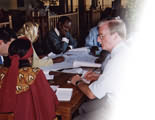![]() University | Search |
News |
A-Z Index | Contact
Us
University | Search |
News |
A-Z Index | Contact
Us

|
|
||||
|
|
||||
Centre for the study of Education in an International Context (CEIC)INTERCOM ARCHIVE |
||||
|
This page ... Related pages ... CEIC Homepage
Meet CEIC Links
|
These are two books about expatriate children and their problems, especially
on repatriation. I recommend both of them to all International Schools,
but for very different reasons. The contrast in approaches - and intended
uses - is itself an illustration of culture-specific attitudes and is
every bit as illuminating as the texts. In the American Social Psychology
idiom, the returning expatriate has been dubbed 'Global Nomad' or 'Third
Culture Kid', and their feeling of separation from supposed brethren which
they experience on coming home is notoriously traumatic. To a European,
raised in a crowded continent with sovereign states a car drive away,
plurality is not so strange, but Americans' ancestors left the Old World,
with its divisions and inequalities, for a better land where all would
be united and equal. The aim of a study of TCKs is the remediation of
the child's pain, and more recently the interpretation of the child's
experience as gain. This thread runs through both books but the modes
of analysis are worlds apart. Pollock, who is a minister of religion and former missionary as well as an academic, is an honoured consultant in the American expatriate field whose diary is booked four years ahead. Van Reken likewise is a respected practitioner and consultant. The world-wide audience which has heard them over 20 years has been waiting for this book. They have delighted in Pollock's charismatic presentations at which he reassures TCKs that feeling like strangers when they go home is normal and that, though they are imperfect Americans, they are perfectly normal TCKs. This is a textbook of self-help, written for counsellors, therapists, sponsoring organisations and expatriates. The approach is phenomenological, with chapters headed 'Benefits and challenges', 'Practical skills' and 'Unresolved grief'. Its references are almost entirely anecdotal, rarely academic, because its authority derives democratically from popular recognition by the subjects themselves and America is even less receptive to intellectualism than Britain. It is designed for use not as a source of theory but for practice, to make unhappy people feel better. It should be in the library of every International School, as a stand-by for those who identify with it and because it sensitively and thoroughly shows others how repatriated Americans see themselves. The second book is also about expatriates whose national identity is
seen as damaged by expatriation, but it reflects
|
More
About ... |
|||||
|
|
|||||||
|
|